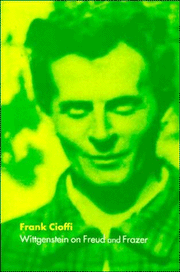Book contents
- Frontmatter
- Contents
- Acknowledgements
- Introduction: Wittgenstein on explanation and self-clarification
- 1 Information, contemplation and social life
- 2 Aesthetic explanation and aesthetic perplexity
- 3 Wittgenstein and the Fire-festivals
- 4 When do empirical methods by-pass ‘the problems which trouble us’?
- 5 Explanation, self-clarification and solace
- 6 Wittgenstein on making homeopathic magic clear
- 7 Wittgenstein and obscurantism
- 8 Wittgenstein on Freud's ‘abominable mess’
- 9 Congenital transcendentalism and ‘the loneliness which is the truth about things’
- AFTERWORD
- Index
Introduction: Wittgenstein on explanation and self-clarification
Published online by Cambridge University Press: 05 January 2010
- Frontmatter
- Contents
- Acknowledgements
- Introduction: Wittgenstein on explanation and self-clarification
- 1 Information, contemplation and social life
- 2 Aesthetic explanation and aesthetic perplexity
- 3 Wittgenstein and the Fire-festivals
- 4 When do empirical methods by-pass ‘the problems which trouble us’?
- 5 Explanation, self-clarification and solace
- 6 Wittgenstein on making homeopathic magic clear
- 7 Wittgenstein and obscurantism
- 8 Wittgenstein on Freud's ‘abominable mess’
- 9 Congenital transcendentalism and ‘the loneliness which is the truth about things’
- AFTERWORD
- Index
Summary
The question which runs throughout these essays is: when is it a mistake to take our interest in a phenomenon in the direction of an enquiry into its causes and conditions rather than towards an enhanced grasp of the impression it produces, or the ruminations it incites? How pervasive is the tendency to proceed as if a phenomenon called for empirical enquiry when what is really wanted with respect to it is clarity as to the sources of our preoccupation and, where appropriate, untroubled contemplation of it? Wittgenstein thought that Frazer's accounts of human sacrifice and other ritual practices, and Freud's dealings with dreams, jokes and mental life in general, provided examples of this error. How are such criticisms to be assessed?
There are complexities and ambiguities in Wittgenstein's denial of the appropriateness of empirical enquiry that arise whatever substantive topic he is dealing with, whether psychoanalytic, aesthetic or anthropological. These complexities and ambiguities emerge clearly in his objections to Frazer's manner of dealing with the enigmatic method of choosing the successor to the priest of the temple of Diana at Nemi in classical times by mortal combat with a runaway slave seeking asylum.
One class of grounds for declaring empirical considerations irrelevant is conceptual. The questions, explicitly posed, make an answer which depends on further information logically anomalous. In his remarks on Frazer's account of the ritual of succession at Nemi Wittgenstein says, ‘The very idea of wanting to explain … the killing of the priest-king seems wrong …’, and that one reason This remark combines both of Wittgenstein's conceptual objections to Frazer's dealings with ritual practices – that the phenomena dealt with are beyond empirical explanation and that understanding them does not require it.
- Type
- Chapter
- Information
- Wittgenstein on Freud and Frazer , pp. 1 - 18Publisher: Cambridge University PressPrint publication year: 1998



